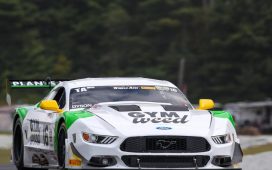The Volkswagen Group has big plans for its new by-America, for-America extended range EV subsidiary, Scout Motors. However, those plans won’t include one longtime ally: its U.S. dealership network.
As InsideEVs reported yesterday, one of the biggest announcements in the Scout debut is that the revived brand won’t rely on a traditional franchised dealer network to sell its off-road focused EVs. Instead, it’s going to direct with a combination of online sales and some physical brand stores where people can experience the cars and get buying advice from representatives, an approach not unlike Tesla, Rivian, Polestar and a few other newcomer electric brands.
“It extends into all the most important nodes of our operations, and that’s reservations, demonstration drives, transactions and financing, and warranty service,” said Cody Thacker, Vice President of Growth at Scout Motors, at Thursday evening’s debut event. “A direct sales model offers us unprecedented commercial flexibility,” he added, including allowing Scout the firsthand data to target sales in certain areas, control the car supplies in those areas, adjust incentives accordingly to demand and other tactics.
In the U.S., state-by-state franchise laws passed over a century generally guarantee that an independent car dealership would have a stranglehold on all of the above. Scout is only the latest to try and form a workaround by going with direct sales, but due to is close proximity to the Volkswagen Group—which does operate with a franchise dealer system in America—may be why dealers are already crying foul. (And over the years, many Volkswagen dealers also craved the kinds of trucks and SUVs that Scout aims to sell, which may have added to their contention.)

Scout Motors
Scout Traveler Electric SUV
According to Reuters, the National Automobile Dealers Association (NADA) said it and state associations “will challenge this and all attempts to sell direct in courthouses and statehouses across the country.” The NADA has issued similar challenges in the past to Lucid, Rivian and Polestar, and has been involved in various legal fights with Tesla for years.
But at the Scout launch, Thacker did not mince words about why the brand went dealer-free for its relaunch in 2027.
“We’re reintroducing a brand to America,” he said. “We’re launching a new platform, we’re watching two new vehicles, and we’re launching a retail network. What we need from the front-line retail employees is full engagement, full enthusiasm and full dedication to pushing sales. Now, if you look at what’s happening in the industry, it’s something very different than that.”
Thacker cited a recent survey of 250 dealership leaders that indicated 49% of U.S. dealers were “not excited at all” to sell EVs. Even in the electric stronghold of California, Thacker said, there remains dealer resistance to stocking and selling EVs. The decision also came down to those common gripes from customers, Thacker added.
“We held consumer product clinics, we held focus groups, we watched a lot of surveys,” he said. “Theme number one is that auto buying is slow and cumbersome. In the year of our Lord 2023, if you can believe it, it took, on average, 13 hours and 31 minutes to buy a vehicle.”

Scout Motors
Scout Terra Electric Pickup Truck
The other issues owners cited were a lack of pricing transparency, lack of training and knowledge from the sales staff and problems with serving customers in the digital age. “So with the direct sales model, Scout Motors can tackle all of these head-on and cure all of these pain points,” he said. “There’s no going into a windowless finance and insurance office to wage war.”
That, however, can be easier said than done. Nearly all the automotive startups that have gone with a direct sales model have had challenges with parts, repairs and recalls, especially for large-scale fleet-wide fixes that go beyond a software update. Presumably, a brand like Scout would have the experience and know-how to get a parts and repair ecosystem ramped up quickly.
Thacker said the plan is to include physical locations called Scout Studios with their own repair bays as well as a mobile repair service. On the former, the goal is to have 1,300 repair bays nationwide by 2032, Thacker said. Much of the maintenance process and the rest of the customer service experience will rest on Scout’s smartphone app.
“We think that we’ll have more success, more efficiency, more opportunity through a
direct scenario,” he said.
Contact the author: patrick.george@insideevs.com







